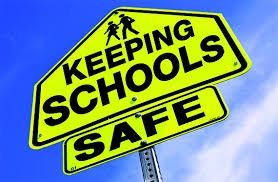Safety is a Key Element of Education
We live in a world increasingly marked by fear. Humans have uncovered more and more ways to hurt one another, both with words and physical violence. As a parent, you are tasked with a very tangible duty: to ensure the safety of your child.
Beginning with the big picture, outside forces are certainly capable of inflicting damage to the building and the people inside. “School” and “shooting” are words  that do not belong in the same sentence, let alone one after the other, and yet, here we are. Violence in schools is rare but unsettling, an evil so palpable it’s almost unthinkable. When I walk in every morning, greeted by ICS security guard Officer Jordan’s smiling face, I am thankful. He is about as kind as they come, but you know he means business! Tornado drills, locked doors, strict sign in/sign out protocols, staff background checks, annual abuse trainings, collaboration with local Fairfax County first responders, and on-site nurses are all ways ICS provides for the physical safety of the students and staff at ICS.
that do not belong in the same sentence, let alone one after the other, and yet, here we are. Violence in schools is rare but unsettling, an evil so palpable it’s almost unthinkable. When I walk in every morning, greeted by ICS security guard Officer Jordan’s smiling face, I am thankful. He is about as kind as they come, but you know he means business! Tornado drills, locked doors, strict sign in/sign out protocols, staff background checks, annual abuse trainings, collaboration with local Fairfax County first responders, and on-site nurses are all ways ICS provides for the physical safety of the students and staff at ICS.
Most of the harm against children, however, isn’t as sinister or grandiose as the targeted violent attacks we see on the news. Often, the students themselves are the ones harming each other. According to a report done by the CDC and Department of Education in 2014, between 1 in 3 and 1 in 4 students in the United States have reported being bullied while at school. The prevalence of this is the heartbreaking reason we are asked as a nation to observe “Bullying Prevention Month,” or as it was previously known, “October.”
 Bullying doesn’t mean a difference of opinion, an isolated dispute, or personalities that just don’t mesh. The ICS handbook defines bullying as “the deliberate use of power to dominate, intimidate and harm another person physically and/or emotionally over an extended period of time with no significant provocation or justification.” These days, there are so many avenues for bullies to explore. If they don’t do it in the classroom, and they don’t do it at the lunch table, or soccer practice, or math club, then they can certainly still shoot off a series of mean snapchats or post a few gossipy comments on Instagram! As a parent, your head probably spins just thinking of all the ways your child’s heart could be hurt.
Bullying doesn’t mean a difference of opinion, an isolated dispute, or personalities that just don’t mesh. The ICS handbook defines bullying as “the deliberate use of power to dominate, intimidate and harm another person physically and/or emotionally over an extended period of time with no significant provocation or justification.” These days, there are so many avenues for bullies to explore. If they don’t do it in the classroom, and they don’t do it at the lunch table, or soccer practice, or math club, then they can certainly still shoot off a series of mean snapchats or post a few gossipy comments on Instagram! As a parent, your head probably spins just thinking of all the ways your child’s heart could be hurt.
As Christians, we’d like to praise ourselves as above bullying, but that’s not the reality. Even at a Christian school where the goal of our existence is to best use our abilities to emulate Christ, we fall short. Bullying happens here, granted not as prevalently as the CDC report suggests, but it happens, and it hurts. And when it does happen, teachers and administration work to resolve conflict quickly.
Lower School Principal Eleane McCoy and Upper School Principal Erin Smith take bullying very seriously. So seriously, in fact, that it spills into their process for hiring new personnel at ICS. In order to prevent bullying, schools must create a culture that fosters kindness and the feeling that students feel comfortable approaching their teachers with the problems they face.
“We hire teachers who care just as much about the students’ emotional and spiritual wellbeing as they do about their academic growth,” says Ms. Smith. “We encourage teachers to be in tune with the interactions amongst peers and to intervene in a shepherding way that shows students how to resolve conflict.”
Dr. McCoy echoes these same sentiments, stating “We seek teachers and teaching assistants who are passionate about their relationship with Jesus. When the faculty pursue a life lived with and for Jesus, the usual outcome is leading others redemptively.”
When asked what practical ways faculty members shepherd here at ICS, Ms. Smith cites small, gender-based lunch groups hosted by the teachers, having supervisory staff on the playground during recess to mediate conflicts as they arise, and collaboration with faculty teams.
Dr. McCoy is passionate about the role of play in early childhood development and is an advocate of the many ways unstructured play time is an integral part of a healthy educational experience. She encourages teachers to have conflict-resolution cards displayed in the classroom, a designated area where students can go to discuss their problems that can be monitored but not micromanaged by the teacher, and giving students the language and tools to discuss their frustrations and feel heard. “Our goal in the Lower School is to prepare the students by practicing over and over again appropriate language so they are empowered to resolve their own issues in and out of school,” says Dr. McCoy. “The key is the commitment that the school and the parents make to help children understand their role in conflict and give them appropriate language to share their feelings.”
 “Lower School teachers shepherd through modeling what a shepherd looks like to the students. They are intentional about developing the language necessary to communicate to others about confessing to one another, forgiving one another, and being reconciled to one another,” states Dr. McCoy. “Teachers take time to hear and help children through the process of conflict resolution using words that are biblical and lead to understanding what Jesus did on the cross for each one of us.”
“Lower School teachers shepherd through modeling what a shepherd looks like to the students. They are intentional about developing the language necessary to communicate to others about confessing to one another, forgiving one another, and being reconciled to one another,” states Dr. McCoy. “Teachers take time to hear and help children through the process of conflict resolution using words that are biblical and lead to understanding what Jesus did on the cross for each one of us.”
Bullying, whether it happens at ICS, soccer practice, or elsewhere, is not an issue confined to the school building. Ms. Smith advocates a partnership approach between home and school. “We welcome parents to let us know if there’s a problem their own child is experiencing,” she says. Often children are shy or embarrassed to admit they’re struggling, but the sooner it is out in the open, the sooner a resolution can be reached at home and at school.
And what if you fear your child is the bully? ICS hopes to help with that too. “Don’t  isolate yourself in terms of feeling that you have to address that alone,” says Ms. Smith. “Bring in the teacher, the parents of your child’s friends, your pastor, youth group leader, and/or counselor for accountability and support. Utilize all available resources. Understand that bullies operate on fear, anxiety, and hurt. They may be acting out to cover something they feel is weakness in themselves.”
isolate yourself in terms of feeling that you have to address that alone,” says Ms. Smith. “Bring in the teacher, the parents of your child’s friends, your pastor, youth group leader, and/or counselor for accountability and support. Utilize all available resources. Understand that bullies operate on fear, anxiety, and hurt. They may be acting out to cover something they feel is weakness in themselves.”
 In the Upper School, Ms. Smith says that there is a gradual release of control where students are given more responsibility to resolve individual conflicts. The hope is that students are able to respectfully work through their problems, bringing teachers in as needed to mediate and encourage.
In the Upper School, Ms. Smith says that there is a gradual release of control where students are given more responsibility to resolve individual conflicts. The hope is that students are able to respectfully work through their problems, bringing teachers in as needed to mediate and encourage.
 In the Lower School, students are offered the opportunity to experience forgiveness. “The rule of thumb is that if the offense requires the teacher to contact a parent, the offender calls and shares with both sets of parents what happened that caused a child to be physically or emotionally hurt,” says Dr. McCoy. “Of course, the teacher or principal call the parents beforehand to make sure they understand that this process allows the student an opportunity to ask forgiveness to the father or mother or the child and the offended child. It also allows the father or mother to show grace and mercy back to the child who did the offense. Parents appreciate the phone calls and the parent of the offender appreciates the help given to their child, who may be tenderhearted but demonstrates a bully attitude.”
In the Lower School, students are offered the opportunity to experience forgiveness. “The rule of thumb is that if the offense requires the teacher to contact a parent, the offender calls and shares with both sets of parents what happened that caused a child to be physically or emotionally hurt,” says Dr. McCoy. “Of course, the teacher or principal call the parents beforehand to make sure they understand that this process allows the student an opportunity to ask forgiveness to the father or mother or the child and the offended child. It also allows the father or mother to show grace and mercy back to the child who did the offense. Parents appreciate the phone calls and the parent of the offender appreciates the help given to their child, who may be tenderhearted but demonstrates a bully attitude.”
This article, from Parents Magazine, includes excellent tips on the course of action to take if your child is experiencing bullying. Tips range from the practical – like contacting the teacher if the bullying is happening at school – to the theoretical – coaching kids on what to do if they find themselves in a hard situation.
Romans 12:18 states “If possible, so far as it depends on you, live peaceably with all.” This verse holds an important reminder: we are unable to control the actions of others, but on our end, we must do whatever we can to treat all people with kindness. Dr. McCoy sums this statement up beautifully in the approach ICS takes in resolving conflict of any kind.
“A question that is always posed to the students in K-4 is, ‘what could you have done differently?’” says Dr. McCoy. “This is a question that is asked of the bully, the bullied, and the bystander.”
As sinful teachers, parents, and students living and working amongst other sinful teachers, parents, and students, this simple question—what could I have done to make this situation better—is the building block for how best to do justice, love mercy, and walk humbly with our God.